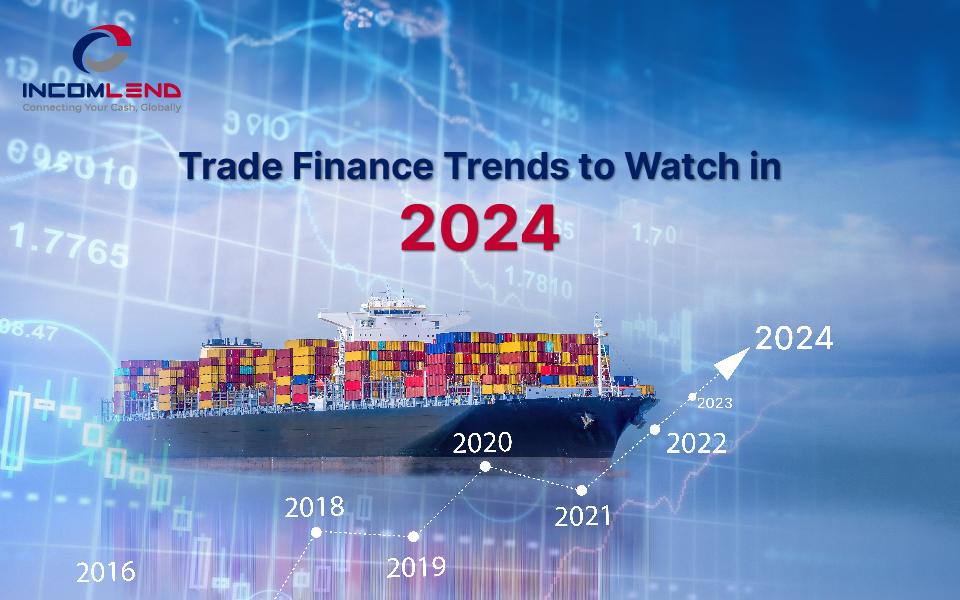Trade Finance Trends to Watch in 2024
15/01/2024
Trade finance is an important part of international trade because it provides businesses with the financial backing they need to conduct cross-border transactions. Trade finance trends evolve alongside the global economy. In this article, we’ll look at the top trade finance trends to watch in 2024 and how they will affect businesses and the trade industry as a whole.
The Growth of Export Finance
Export finance, often known as export credit, is a type of trade finance that offers financial assistance to enterprises that export goods or services. This sort of funding has grown in popularity in recent years and is projected to expand further in the future.
One of the primary reasons for the development in export finance is the growing demand for goods and services from emerging economies. As these markets expand, businesses seek new ways to fund their export efforts and capitalize on the opportunities they bring.
Furthermore, export funding is becoming increasingly available to small and medium-sized businesses (SMEs). This enables smaller enterprises to compete in the global market and broaden their scope.
Digitalization of Trade Finance
The trade finance business has traditionally been paper-based, with a strong emphasis on physical papers and manual operations. However, with the advancement of technology, the industry is undergoing a digital transition.
Digital trade finance is the use of technology to streamline and automate trade financing procedures. This involves the use of electronic documents, online platforms, or blockchain technology.
The digitization of trade finance provides various advantages, including enhanced efficiency, competitive pricing, and improved security. It also facilitates coordination among various stakeholders involved in a trade transaction, including lenders, exporters, and importers.
The Rising Importance of Trade Credit
Trade credit, sometimes known as supplier credit, is a sort of short-term financing that enables firms to purchase goods or services on credit from their vendors. This sort of funding has grown in popularity in recent years and is projected to expand further in the future.
One of the primary reasons for trade credit’s growing importance is purchasers’ increased need for flexible payment arrangements. As firms seek strategies to manage their cash flow and decrease financial risk, trade credit provides a feasible option.
Furthermore, as digital platforms that connect buyers and suppliers grow in popularity, trade finance is becoming more accessible to businesses of all sizes. These systems enable enterprises to easily negotiate and monitor trade credit arrangements, making them a more appealing option for financing trade transactions.
The Effect of Geopolitical Events on Trade Finance
Geopolitical events, such as trade wars and political instability, have a considerable impact on the global economy and, by extension, trade finance. In recent years, we have seen how these occurrences can disrupt supply chains and generate uncertainty for enterprises involved in international trade.
In 2024, geopolitical events will continue to have an impact on trade finance. As countries continue to negotiate trade tensions and political upheavals, businesses must be prepared for unexpected disruptions and have backup plans in place.
This could lead to an increase in demand for trade finance products like trade credit insurance, which can help alleviate the financial risks associated with such situations.
The Development of Alternative Financing Options
Traditional trade finance products, such as letters of credit and documentary collections, have long been popular among international trade enterprises. However, in recent years, we have seen the growth of alternative financing solutions that provide greater flexibility and better conditions to firms.
One of the most important alternative financing possibilities is supply chain finance, which enables businesses to obtain funding based on their supply chain partnerships. This sort of financing is especially useful for SMEs since it allows them to use the creditworthiness of their larger customers to obtain finance at reduced rates.
The importance of sustainability in trade finance
Sustainability has become a priority for both organisations and consumers, and this trend is projected to continue in the future years. As a result, we may expect to see sustainability becoming more important in trade financing.
One way this could materialise is through the use of sustainable trade finance products like green trade finance and sustainable supply chain financing. These products offer finance to firms that engage in sustainable activities such as renewable energy projects or sustainable supply chain operations.
Furthermore, we may witness a rise in demand for sustainable due diligence in trade financing transactions. This might include requiring enterprises to demonstrate their sustainability practices and policies before being accepted for financing.
Importance of Risk Management in Trade Finance
As the global economy grows increasingly integrated, the dangers associated with international trade increase. This makes risk management an essential component of trade finance, and we should expect to see a growing emphasis on it in the coming years.
One way this could materialise is the use of technology to identify and manage risks in trade finance transactions. This could entail applying artificial intelligence and machine learning to data analysis and risk identification.
Furthermore, we may see an increase in the usage of trade credit insurance, which can assist reduce the financial risks connected with international trade. This sort of insurance covers non-payment by purchasers, political hazards, and other trade-related risks.
Conclusion
The trade finance market is continuously evolving, and organisations must stay up to date on the latest developments to remain competitive. In 2024, we may anticipate an increase in export finance, digitization of trade finance, and the growing relevance of trade credit.
Geopolitical events will continue to affect trade financing, and businesses must be prepared for unexpected interruptions. In the future years, the trade finance environment will be shaped by the rise of alternative financing sources, as well as an increased focus on sustainability and risk management.
Businesses that remain aware and react to these trends can position themselves for success in the ever-changing world of trade finance.
